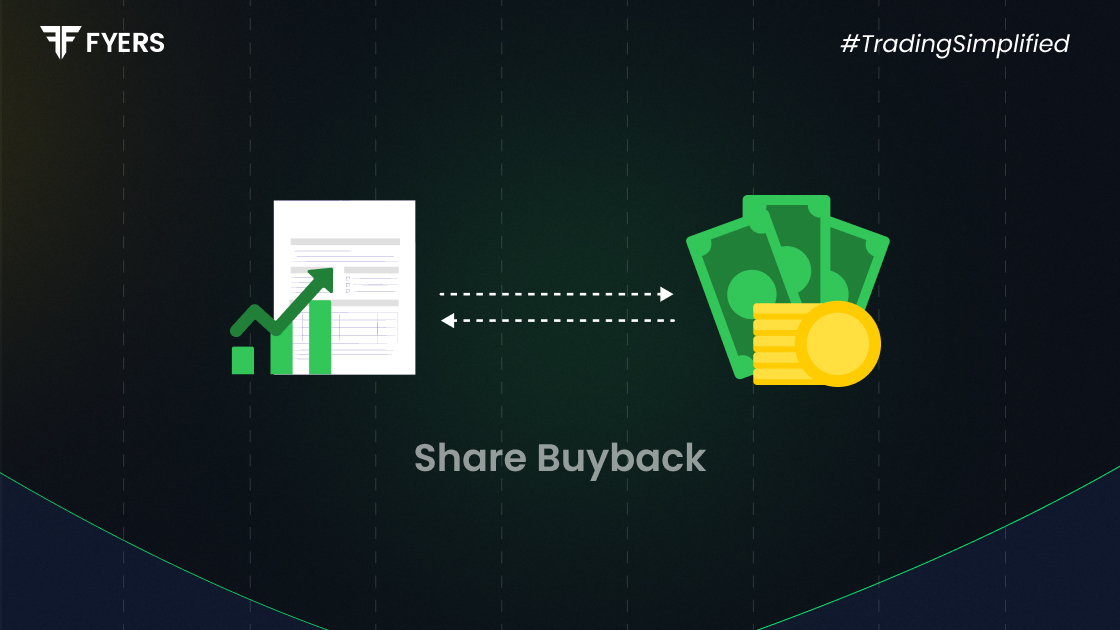

 15 Sep, 2025
15 Sep, 2025
 5 mins read
5 mins read

Companies often look for different ways to reward shareholders, especially when they have extra cash and may not have immediate projects to invest in. One such way is through a share buyback, where a company purchases its own shares from the market or its existing shareholders. This move can send strong signals about confidence, improve financial metrics, and sometimes offer shareholders a better exit option.
A share buyback, also known as a stock repurchase, is when a company buys back its own shares from existing shareholders. This is usually done at a price higher than the market value to encourage participation.
The main aim of a buyback is to reduce the total number of shares in circulation, which increases earnings per share (EPS) and may lift the share price. It is also viewed as a strong signal that the company believes its stock is undervalued.
The share buyback process typically unfolds in the following steps:
Board Approval: The company’s board approves the buyback proposal.
Public Announcement: The company announces details such as the number of shares, buyback price and timeline.
Mode of Buyback: The buyback may take place via tender offers, open market purchases, or other approved methods.
Execution: Investors who wish to participate tender their shares during the specified window.
Once complete, the repurchased shares are either cancelled or held as treasury stock, reducing the overall share capital.
Indian companies can carry out share buybacks using the following methods:
Tender Offer
The company offers to buy shares directly from shareholders at a fixed premium price within a set period.
Open Market Purchase
Shares are repurchased directly from the stock market at prevailing prices. This method offers flexibility and can be spread out over time.
Book-Building Process
Though less common, this method involves inviting bids from shareholders and setting the buyback price based on demand.
The choice of method depends on company goals, liquidity, and compliance requirements.
Share buybacks benefit both companies and investors:
For Companies
Optimises capital structure by reducing excess cash.
Boosts earnings per share (EPS), improving financial ratios.
Sends a positive signal of confidence in the company’s valuation.
For Investors
Provides an exit opportunity at a premium price.
Can increase shareholder value as fewer shares push up demand.
May be more tax-efficient than dividends, depending on regulations.
A notable example is the Infosys share buyback of 2022. The company launched a buyback worth Rs 9,300 crore through the open market route, repurchasing shares at a price of up to Rs 1,850 per share. This move not only signalled confidence in the company’s long-term growth but also rewarded shareholders by improving earnings per share. The buyback reflected the company’s strategy to efficiently utilise surplus cash while reinforcing investor trust.
The Securities and Exchange Board of India (SEBI) oversees share buybacks. Key regulations include:
Companies can repurchase up to 10% of total paid-up equity and free reserves without shareholder approval. For up to 25%, a special resolution is required.
The buyback must be completed within one year of approval.
A cooling-off period is mandatory before launching another buyback.
Repurchased shares must be extinguished and destroyed within seven days of completion.
These rules aim to ensure transparency and protect investors.
Retail investors can participate, especially through tender offers. The process involves:
Check Eligibility: Shareholders as of the record date are eligible.
Receive Offer Letter: The company provides details of the buyback.
Tender Shares: Investors can submit shares through their broker or depository participant.
Receive Payment: Accepted shares are bought back, and proceeds are credited to the investor.
Investors should weigh the buyback price, acceptance ratio, and tax considerations before taking part.
A share buyback is more than a financial exercise. For companies, it signals confidence and a commitment to return value to shareholders. For investors, it can mean an exit at a premium or the prospect of holding a leaner, stronger stock. When timed well, a share buyback becomes a bridge between corporate strategy and investor reward, strengthening both balance sheets and trust in the market.
Investor takeaway: Before participating in a buyback, compare the offered price with the company’s fundamentals and your own investment horizon. If the buyback price is significantly above the fair value and you plan to exit soon, it may be worth tendering. If you believe in the company’s long-term growth, holding on could yield greater rewards.
It is when a company buys back its own shares from shareholders, reducing the number of shares in circulation. This often boosts earnings per share and can increase stock value.
Generally good, as it can raise share prices, improve financial metrics, and provide an exit at a premium. However, the actual benefit depends on the company’s financial health and the buyback price.
Buybacks offer more flexibility, can signal undervaluation, and may be more tax-efficient for shareholders compared to dividend payouts.
Yes. Under current rules, the company pays buyback tax. Shareholders do not pay additional tax on proceeds received, though consulting a tax advisor is recommended.
Calculate your Net P&L after deducting all the charges like Tax, Brokerage, etc.
Find your required margin.
Calculate the average price you paid for a stock and determine your total cost.
Estimate your investment growth. Calculate potential returns on one-time investments.
Forecast your investment returns. Understand potential growth with regular contributions.